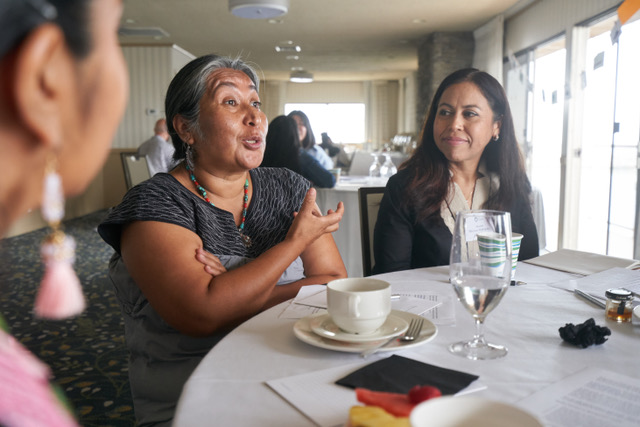Recent pieces in Alliance magazine have attempted to poke holes in trust-based philanthropy, the approach to giving that is being increasingly recognized as a strategy to address the inherent power dynamics between funders and nonprofit organizations.
From significant criticism to ambivalent curiosity, these pieces reveal some significant mischaracterisations and misunderstandings about what trust-based philanthropy actually is. While the authors raise serious questions about philanthropic practices at large, they paint a picture of trust-based philanthropy so distorted that it rings unrecognizable to those of us who practice it.
As longtime grantmakers and co-founders of the Trust-Based Philanthropy Project, we have evidence that this approach works. At its core, trust-based philanthropy works to build a more equitable nonprofit-funder ecosystem through a rigorous approach that values relationship-building and power-sharing over transaction and control. By giving nonprofits the ability to plan, grow, and innovate around emergent needs, it helps foster a healthier and more resilient social sector. This has been backed by many others in the sector, including foundations, philanthropic serving organizations, and nonprofit leaders demonstrating that trust-based philanthropy significantly reduces the burdens on nonprofits and helps them advance their intended impact.

The Durfee Foundation. Photo credit: Leroy Hamilton.
The aspects of trust-based philanthropy that have gotten much less airtime, however, are the nuances, rigours, and core equity values of this approach. To foundation staff and other funders who have the honour and responsibility of stewarding your organization’s funds ethically and responsibly, we are here to offer some clarity about what trust-based philanthropy is and what it isn’t:
- Trust-based philanthropy includes much more than unrestricted funding. While MacKenzie Scott’s historic decision to give away billions in unrestricted grants has been commendable, unrestricted funding alone does not equate to trust-based philanthropy. In addition to advocating for flexible funding and streamlined paperwork, a trust-based approach centres relationship-building, mutual learning, and transparency between funders and nonprofits. In a trust-based context, funders see our role as partners, seeking to support rather than control nonprofit leaders who are more proximate to the issues we seek to address. It also invites funders to do their homework when considering prospective grantees – including exploring publicly available materials and having conversations with community stakeholders – while checking our own biases and assumptions that are often rooted in white-dominant norms. When we are not honest about confronting our own biases, we run the risk of widening the gap between the well-resourced legacy nonprofits and emerging, grassroots, and/or BIPOC-led organizations that have been historically excluded from the philanthropy table.
- This is not about naïve or unconditional trust. One of the main reasons we name and embrace trust is because traditional philanthropy has operated predominantly from a place of distrust. This is exemplified in the burdensome and antiquated grantmaking structures that require nonprofits to prove that they are trustworthy based on foundation-defined standards. When an uneven power dynamic forms the basis of the relationship, it is virtually impossible for funders to have honest and open relationships with our nonprofit partners. However, when we work intentionally to establish a sense of trust, it allows for transparency and accountability that wouldn’t be possible otherwise. We are able to have deeper conversations and gain a more realistic understanding of the goals, challenges, and opportunities facing our nonprofit partners. In a trust-based paradigm, an essential and ongoing part of our work is to actively cultivate that trust and accountability – both with grantee partners, as well as within our organizational cultures and structures – while establishing a shared understanding of what it takes to maintain (or break) that trust.
- Equity values are essential to this approach – otherwise, funders run the risk of perpetuating inequities. Trust-based philanthropy starts with recognizing that we operate in an inequitable sector and society that is rooted in white-dominant norms and assumptions. Philanthropy’s standards of ‘trustworthiness’ – often defined by financial data, quantifiable impact, and academic achievement – are inherently top-down and exclusionary. This narrow approach excludes visionary nonprofit and community leaders who have been systematically overlooked and undervalued. Taking a trust-based approach pushes funders to be more aware of our own power and implicit biases; it requires us to recognize the roots of white dominance in our systems and structures, and it invites us to take a wider lens on how we understand trustworthiness and impact. It also encourages funders to consider multiple points of view, and make sure that decisions are informed by grantees, communities, and others who are more proximate to the issues we seek to address. From there, we can attempt to repair past harms, build trust, and advance our vision for a more just, healthy, and connected society.
Contrary to the points raised in the recent critique by Simon Sommer, trust-based philanthropy is not a new concept, nor is it U.S.-centric. While the approach formally originated in the U.S., its values and approaches have been practised and embraced by grantmakers around the world (including India, East Asia, and Australia) who have long recognized the need to shift power in order to be in the right relationship with communities. And in addition to the Trust-Based Philanthropy Project in the U.S., several organized efforts have cropped up outside of the United States – including IVAR’s Open & Trusting Initiative in the U.K. and the Right Relations Collaborative in Canada – as an intentional strategy to shift the power imbalances that exist between funders, nonprofits, and communities.
This growing community of trust-based funders is building a funder-nonprofit ecosystem that works for all people. It’s hard for some to imagine because it looks so different from the mainstream philanthropy we know today. And it makes sense that upending old norms would lead to so much misunderstanding or resistance from those comfortable working within such a system. We invite our colleagues across philanthropy to look beyond the headlines and do a deeper study: you’ll find hundreds of funders creating proactive diligence, highly diverse leaders and networks, and strong accountability to communities.
Carrie Avery is President of the Durfee Foundation. Pia Infante is Co-Executive Director of The Whitman Institute. Philip Li is President & CEO of the Robert Sterling Clark Foundation. Brenda Solorzano is CEO of the Headwaters Foundation. They are all members of the Trust-Based Philanthropy organisation Steering Committee.






Comments (4)
You wouldn't have said it any better. In essence, if we seeking equity across the spectrum, lets be equitable first. Let the change we seek to create and sponsor come from the beneficiary voice in all our program interventions.
Admirada de las propuestas de la filantropía siento que es un avance en la equidad y en la igualdad de oportunidades en el real compartir se sobrepaso el dar desde una vision del que tine sino desde el verdadero altruismo que la gente que viven la pobreza fruto de un sistema tenga oportunidades de compartir el poder que se va abriendo poco a poco comenzando por sentirles autores y protagonistas de su proyectos. He trabajado mucho en el Ecuador en proyectos y me encantaría poder contar con la ayuda de ustedes en un gran sueño que vamos tejiendo mujeres escritoras con apertura global y todos y todas somos uno lección de esta pandemia.
يشجّعني أن اقول لازلنا نعاني من ردود . الفعل العنيفة والنظام الذكوري والتهميش والاقصاء وعدم تكافؤ الفرص والاعتقال والتعذيب والعنف القائم على النوع الاجتماعي وعدم المساواة والتمييز
love to see more focus on true participatory grantmaking - those impacted have equal if not all power in decision making on how money flows.